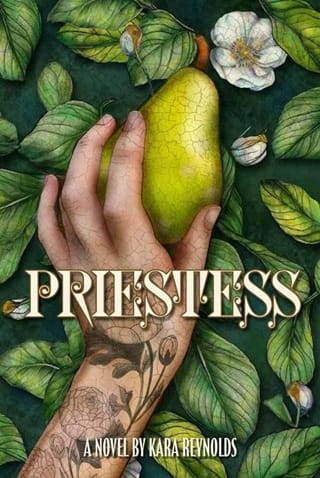6. Tattoo
As anticipated, the spring sun blazed down on our heads.
The four of us scribes had still had our aprons on under our now filthy priest robes.
We managed to tie them together and string them from one side to the other of the wagon, but it only offered coverage for most of the space.
Later on in the day, I had not had a turn to rest and had stationed myself to stand in the sun.
Behind me, everyone was resting on the floor or leaning against each other under the aprons.
I was the only one awake.
I could not find rest in any position.
I was also the only one fully in sunshine.
We could have used the priest robes but we had dismissed that suggestion.
When pretending, the last thing a pretender does is remove a disguise.
Two men rode on each side of the wagon and two rode ahead with the rest of the company behind.
I noticed they shifted positions every few hours.
They did not stop to eat or drink.
Some of them pulled jerky from their saddlebags or took swigs from canteens.
I prayed we would be fed soon.
It would seem the goal was to cover as much ground as possible.
Sensing the pinkness spreading on my skin and not wanting to increase my freckle count, I turned away, offering the sun the other side of me through the slats.
My eyes met the captain’s.
He had apparently taken a shift riding on this side of the wagon.
How long had he been there?
“No shade for you, priestess?”
he asked, unblinking, his gaze going from the stretched aprons and back to me.
“I do not mind the sun,”
I said.
I made myself not look away.
“What need does a priestess have for an apron?”
His tone was bored as was his face, as seemed to be its permanent state.
But his eyes were alert.
I opened my mouth to suggest we were feeding the poor, as would a cleric in the order of Rodwin, but Mischa and I both had blue and black ink all over ours and Helena and Maureen’s were full of colors for illuminating manuscripts.
I had always been an imaginative child.
My parents had said I was a liar.
Perhaps I was.
But when you leave an intelligent child to their own devices, they have to devote themselves to something.
I devoted myself to books.
I read everything I could find that was not the teachings of Rodwin or essays on the teachings of Rodwin.
Many stories were deemed too sinful to have in the house but my pious father had a liking for adventure stories.
I had cut my teeth on those and then graduated to other more secular texts and histories.
And in the right parts of Apollon, Perpatane’s capital, in the right shops, you could find the really good books, romances.
In my youth, allowed to roam for an hour or two on market days, I found these shops.
I had a small allowance as the child of a priest, a king-paid position.
I was not from a wealthy home, but we were comfortable, my father respected in the clergy.
I spent every coin on books.
The books in Eccleston had been endless.
I read every affordable book that I came across, as long as it was not one of faith.
In most parts of the continent, printing presses were not prevalent and books remained expensive, so scribes and scriptoriums always had work.
But Eccleston was the city-state of education and we had more presses and bookshops than any city.
Eccleston even had a public library but fines were high if you damaged a book.
Our little family of four shared every book one of us got their hands on.
Helena and I had been instant friends, both hired at the scriptorium at the same time.
She was paying a neighbor woman to watch a little Maureen while she illuminated to support them.
We had shared books with each other.
One winter later, Mischa had been hired and her love of books endeared her to us.
Eventually, we, because of books, became a sort of family, me, a runaway wife, Helena and Maureen, an abandoned mother and daughter and Mischa, determined to be independent.
I thought of our three little bookshelves in each of our three little homes and sighed.
I could not think of that now.
And as a woman with an imagination and a love of reading, I could tell a story.
I looked at my left hand resting on my right one, both holding on to a wooden slat, my cheek, the three blue streaks now smeared, resting above them.
“Did you see the ink on the aprons?”
I asked the captain.
He blinked.
Taking that as a yes, I held out my left hand through the slats.
On the back, covering it nearly entirely was the blue tattoo of a ranunculus flower.
“We often mark each other in sacred symbols that honor Saint Agnes.
This flower holds meaning for us as each bloom can hold over one hundred petals.
Agnes wrote in her journals that it was her favorite flower.
Because our minds can contain multitudes.”
I hoped he didn’t know the difference between ink for the skin and ink for lettering and painting.
I also hoped he had no familiarity with the journals of the pragmatic saint for, while her words were always cheerful endorsements of industry and learning, I doubted she had included her favored blossom.
Around my thirtieth winter, when Mischa had come to the scriptorium as a willful woman of twenty-one with a moth tattooed on the side of her neck, I went with her to see her tattooist.
I let a mute woman with ink in every color on every part of her skin, mark a small quill on the inside of my left palm.
I had thought I would get something easily hidden and that had been in vain.
For I found I loved looking at my little quill.
I felt, at that age, if time could put lines on my face, I could put them on my body.
And so on my left arm, from shoulder to knuckles, I had botanical illustrations in blue, some designed by Helena and Maureen, some by the mute woman.
The most painful was the back of my left hand.
But it was my favorite.
And Thrush would have hated it.
The captain’s eyes had moved slightly.
I saw that they dipped down to my mouth, watching me speak.
But they still held that sharpness.
Flustered by his opaque stare, I blurted out, “Does Tintar have ranunculi?”
The two lines between his brows deepened. “What?”
“The flower? The ranunculus flower?”
“I have no idea, madam.”
His eyes were now back on mine.
Just when I was certain he nearly never blinked, he did and asked, “How far up does it go?”
“How far does what go?”
There was the tiniest movement at the corner of his proud mouth.
I guessed this Alric did not smile and did not laugh.
As far as I knew, this could be his idea of grinning.
“Your tattoo,”
he finally said.
“How far up does it go? I see there is more there than just your ranunculus.
Are those fern leaves?”
Under the robe, I had pushed up the sleeves of my scribe dress.
We were all sweating under the sun and the arm of the robe had fallen into the crook of my elbow.
The ferns wrapped around my left arm were on display.
I took in the state of me.
I had taken my chestnut brown waves down from their braid crown to relieve the soreness in my scalp but my hair was starting to stick to my neck with sweat.
My white robe was now covered in dirt.
I looked from myself back to him and saw a challenge in his eyes.
“Also,”
he continued, “I am not a well-read man, but I am a traveled one.
I always understood Saint Agnes to be a saint of common sense.
Not one of… symbols.”
That is when I knew he did not believe we were priestesses.
If he had, time away from the scene of battle had given him room to think and he suspected we were not clerics.
Should I offer a meaning Agnes had for ferns? I had thought my inventive explanation of the inky aprons was good, but he was one step ahead of me.
“As I said in the chapel,”
he was saying, “Ecclestonians are a godless people.”
I wanted to answer irritably but politely I asked, “Did you want me to answer?”
“How far it goes? Yes.
If you wish to tell me.”
My mouth opened to speak and I again saw his eyes return to it.
I was not a raving beauty but I was no wallflower.
And there had been, in my life, men that found me irresistible.
Every remotely good-looking woman with a dash of self-awareness understands that about herself.
There are men that want you madly, but the next man you meet may walk right past you without so much as a look.
At my age, I knew when I had met a man of that first kind.
Yes, he had heat in his eyes.
As guarded a mind as his, as placid as his face, he was still a man.
I closed my mouth.
Then slowly, I smiled.
“It goes up far.
Very far, you could say.”
The most minuscule of changes crept over his features.
I turned away from him and faced my fellow prisoners.
Helena was awake, the only one.
She had witnessed the conversation between me and our captor in command.
“What are you plotting, Edie?”
For some reason, my reply was breathless.
“I don’t know yet.
But something.”
“If you play with fire, do not burn us.”
Hurt, I looked at her questioningly.
“You are my bravest friend,”
she said.
“But take care, whatever you are about.”
 Fullepub
Fullepub 



